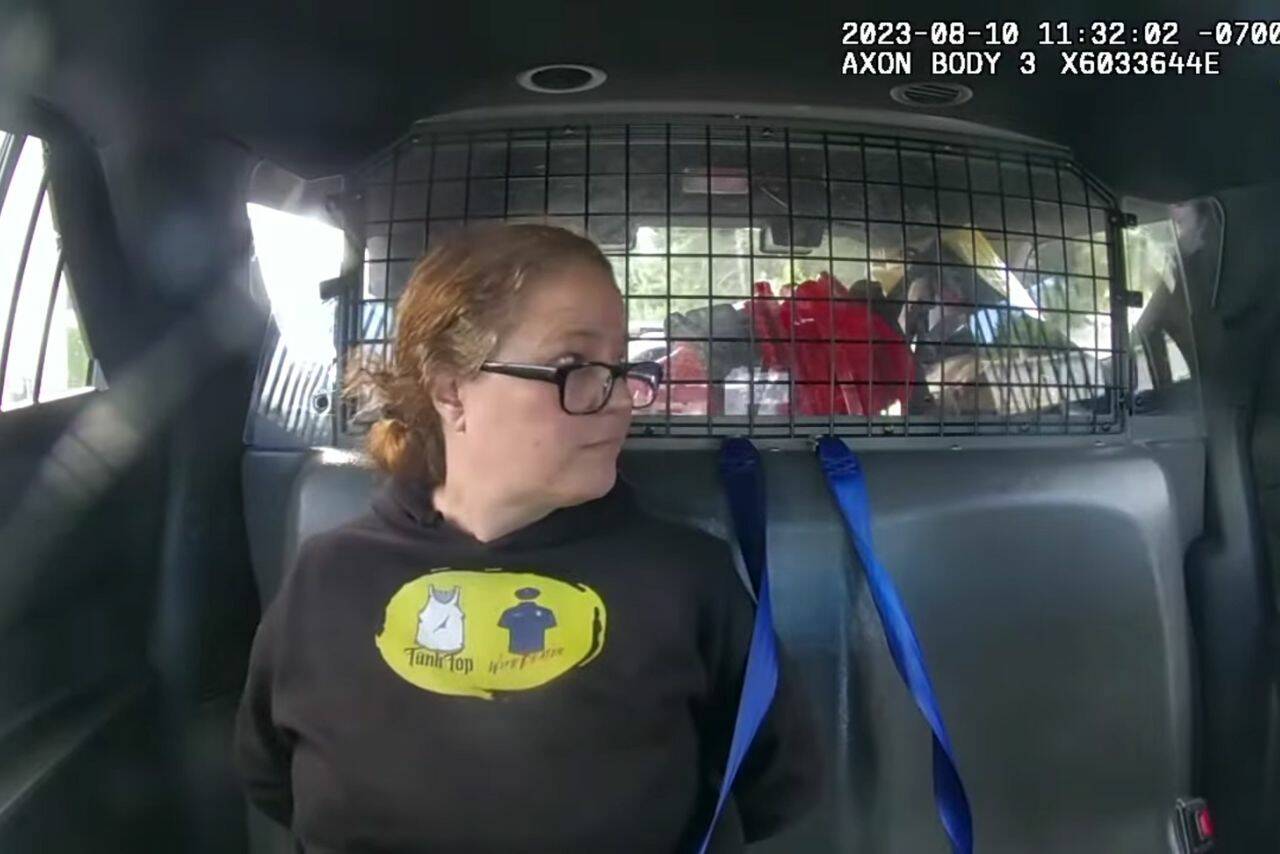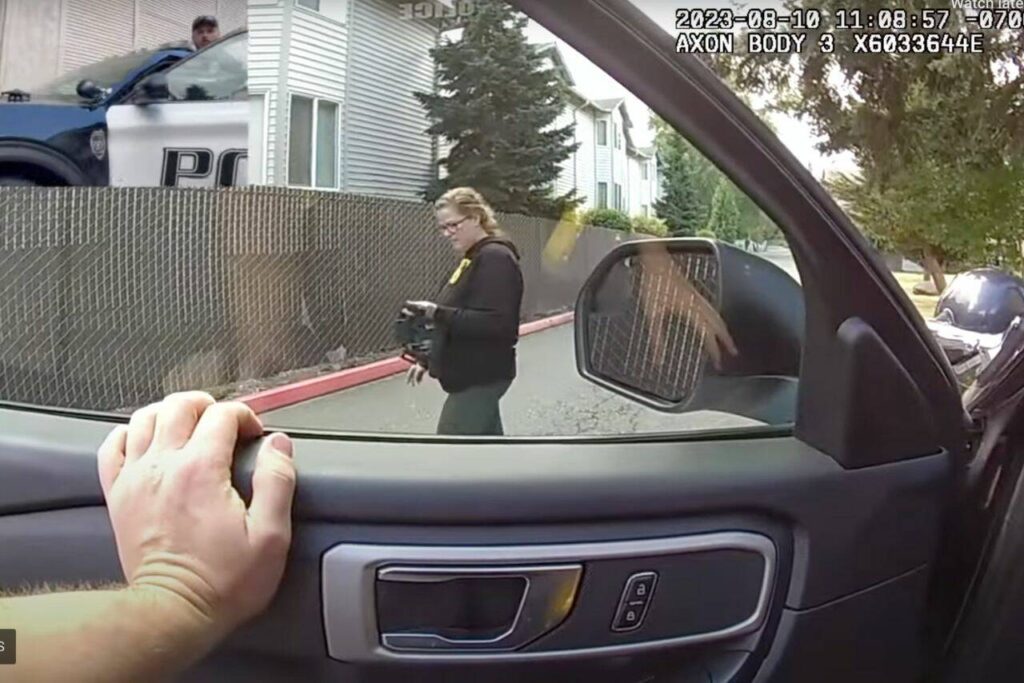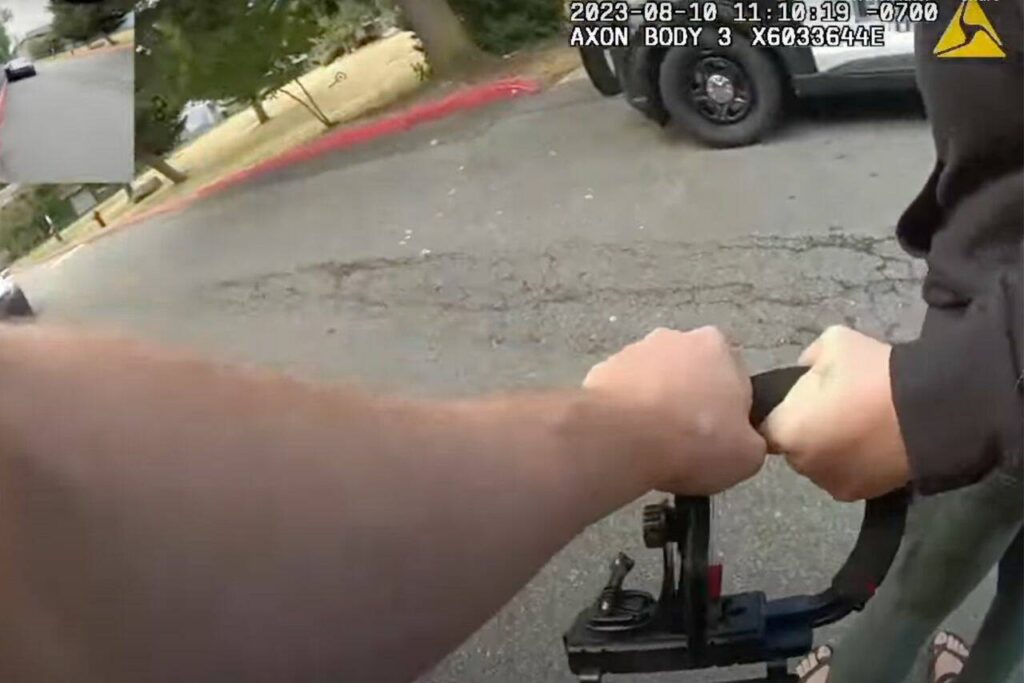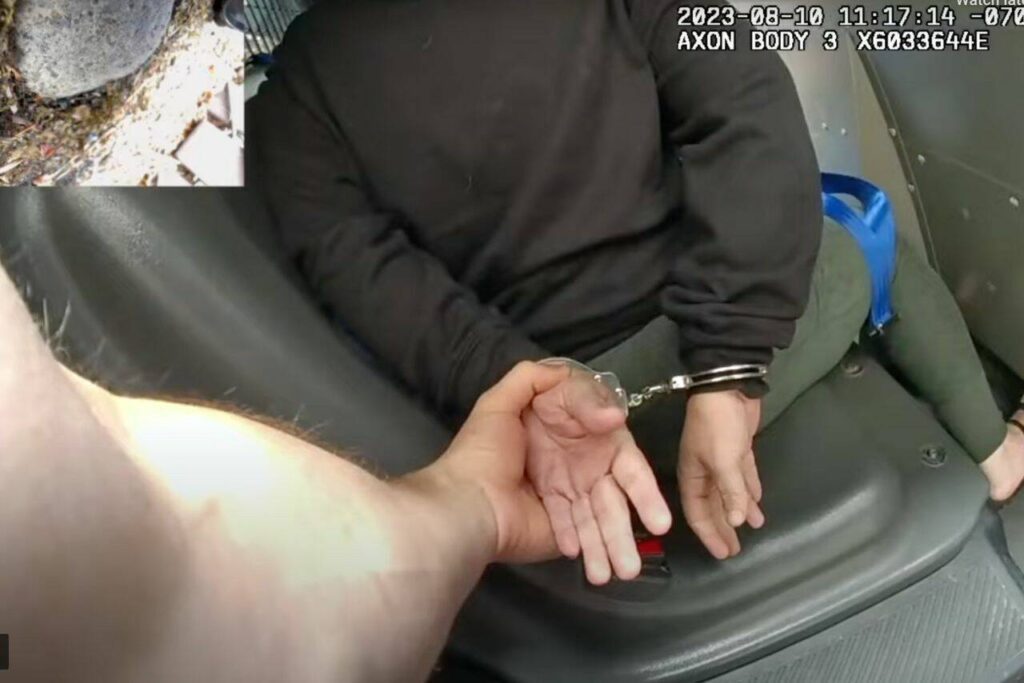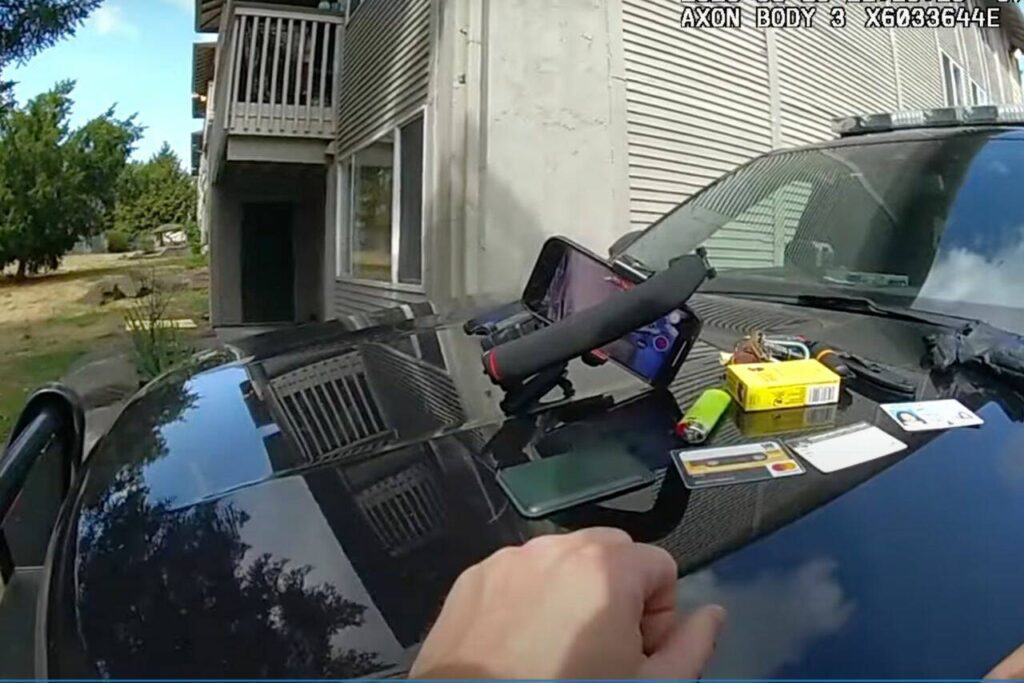EVERETT — On a warm August morning, Molly Wright heard shouting outside her apartment at the Bluffs at Evergreen.
She grabbed her phone and a camera stabilizer around 11 a.m. Aug. 10., then approached an Everett officer’s patrol car parked along a private street at 2 West Casino Road.
Officer Ryan Greely had just arrested a man suspected of trespassing at the Bluffs multiple times. Greely took a seat in the patrol car, in front of his computer. Moments later, he looked up to see Wright walking toward his car slowly, in a hoodie and sandals, panning the camera across the hood. Greely opened the door.
“Can you please step back? Or you’ll be arrested for obstruction,” he warns her, in a 39-minute video of his body camera footage Wright posted to YouTube this month.
“Good luck, good luck,” Wright responds. “Obstruction requires a physical act.”
In the footage, she backs up to a curb, roughly 15 feet from the officer.
“You’re fine, I ain’t going to hurt you,” says Wright, 45. “I’m not even armed.”
The officer walks across the street and handcuffs her for investigation of obstructing law enforcement, a misdemeanor.
The arrest raises questions about whether Greely violated Wright’s First Amendment right to film police in public, a right that has been affirmed by the state Supreme Court, in cases including Lewis v. State, Dept. of Licensing (2006) and State v. E.J.J. (2015).
A person has the right to record police on duty as long as they keep a “reasonable distance,” according to a “Know Your Rights” guide published by the ACLU of Washington.
“Police officers may not confiscate or demand to view your photographs or video without a warrant, nor may they delete data under any circumstances,” the ACLU guide reads.
Officers “may order citizens to cease activities that are truly interfering with legitimate law enforcement operations,” according to the guidelines.
Everett police’s policy manual states: “Members of the public, including media representatives, have an unambiguous First Amendment right to record officers in public places, as long as their actions do not interfere with the officer’s duties or the safety of officers or others. Officers should assume that they are being recorded at all times when on duty in a public space.”
Around the country, police departments have paid out numerous six-figure settlements for unlawful arrests of people trying to film them in public, especially in the aftermath of George Floyd’s death. For example, last year, the Spokane Police Department paid out $57,000 to a witness who was arrested for trespassing in a private parking lot, when officers took issue with her filming them doing interviews in public.
The city of Everett stood by the decision to arrest Wright in a statement to The Daily Herald this month. However, an Everett judge dismissed the criminal case without prejudice on Nov. 16, following a motion from a city prosecutor.
In an interview, Wright said she intends to sue for what she claims was an unlawful arrest.
“My rights were violated, we are supposed to be able to film our police when they’re in action,” Wright said on the balcony outside her apartment.
Wright obtained Greely’s body cam footage through a public records request. She posted videos of the incident from two angles: the footage from her phone, as well as Greely’s point of view.
“We do not believe he (Greely) acted outside of policy or law in this incident,” Everett officer Ora Hamel said Friday. “As an agency, we are commonly filmed by members of the public and understand it is their right to do so. We only ask that the filming occurs at a distance where it is not interfering with our duties or putting our officers in a place where they need to be concerned about their safety.”
‘Or I’ll put you on the ground’
Security called Greely around 10:55 a.m. for reports of a man who had trespassed multiple times at the Bluffs, behind the Fred Meyer at Evergreen Way and Casino Road. He turns on his camera.
As a security guard watches, the suspect briefly tries to explain: He’s picking up a pair of shoes, and he’s leaving. Greely arrests him and puts him into the back of the patrol car, as the detainee protests with his voice raised. Wright shows up with her camera about eight minutes later. The officer claimed his computer screen was in view of Wright’s lens.
“I cannot continue my investigation with you coming up to my car,” Greely says. He got back in the vehicle.
Wright, now standing on the curb, continues filming. Greely tells her to step away, pointing to another curb and saying, “You can stand over there on the curb. … I don’t have a cover (officer). You can stand over there.”
Wright tells him she was not armed.
“Yes, you are, you got a knife,” Greely says as he walked up to her. Wright later acknowledged she had a small knife and pepper spray on her, for self-defense.
On video, Wright remains calm for most of the encounter, standing still when the officer approaches her. Greely throws out Wright’s cigarette and grabs her camera stabilizer. He orders her to drop it.
“Put it on the ground, or I’ll put you on the ground,” Greely says, restraining her.
The officer pats down her body, taking her phone, wallet and keys out of her pockets. He asks her if she had anything in her bra. She tells him no.
“Obstruction is a physical act,” she says a moment later.
“You were physically obstructing me,” he replies.
“Really? So I came between you and your subject? I came between you and your subject? Did I? Yes or no?”
“You became (between) me and my job. … I can’t do my job with you hovering around,” he says. “I can’t access my computer, with you — I could not do my job with you coming around, violating access.”
Deputy Police Chief Jeraud Irving happened to be in the area and arrived on scene as Wright was detained.
“Jeraud, he was on scene and just allowed it,” Wright said. “So he saw that I was recording. So he knew exactly what I was doing. There was no ambiguity of that situation.”
Hamel clarified Irving was acting as a cover officer for Greely.
“If Deputy Chief Irving observes an officer acting outside of the policy or law, he would intervene and correct their actions,” Hamel wrote.
After Greely put Wright in his patrol car, a security guard told the officer that Wright had filmed him a few months ago, too, and “put me all over YouTube.”
“I’m sure I’ll be on YouTube now,” Greely replied.
Wright sat in the back seat as Greely drove to the Snohomish County Jail in downtown Everett. On her hoodie was a drawing of a sleeveless shirt, with the caption “Tank Top.” Next to it was a cop’s uniform, labeled, “Wife Beater.”
Obstruction of a law enforcement officer is a gross misdemeanor. According to state law, it’s illegal if a person “willfully hinders, delays, or obstructs any law enforcement officer in the discharge of his or her official powers or duties.”
Wright has posted other encounters with police — in incidents she believes show misconduct — on the YouTube channel, “A Pig’s Daughter.” Her father was a police officer, she said. She said she supports “good officers, and good people, like people with good intentions and whatnot, and put their best foot forward.”
“What I don’t support,” she said, “is officers who think that their badge gives them power and authority over the public, which they derive their power from us.”
‘They committed a crime’
Wright spent about eight hours behind bars.
After Everett Municipal Court Judge Amy Kaestner dismissed the misdemeanor charges this month, Wright posted her court hearings on YouTube, too.
At an Aug. 23 hearing, Kaestner reviewed a six-paragraph narrative from Greely.
“Wright was armed with a knife and pepper spray, within 10 to 15 feet from me, refusing my repeated lawful commands to stay at a safe distance,” Greely wrote. “Trying to record my mobile computer with sensitive information on it.”
Kaestner found probable cause for the obstructing charge.
The city also asked for an “exclusion order” to ban Wright from the Bluffs property, where she has lived for four years.
“Why is the city asking for an exclusion order in this case?” Kaestner asked the city’s deputy prosecutor.
“Well, from our knowledge, and for the probable cause statement,” the deputy prosecutor replied. “She has been trespassed from that location multiple times in the last couple days.”
“That’s — not her, that’s the individual that was being arrested,” Kaestner corrected her. “She was trying to film the incident, apparently, and was not following commands to stay out of the way, is the allegation. So I’m not entering the exclusion order, given those facts. Not sure why the city is asking for that, based on her actions.”
As of Friday, the body camera video had about 1,400 views on YouTube.
Last week, Everett police agreed to answer questions about the arrest, but advised The Herald to “consider” not publishing a story due to the potential “inflammatory effect.” City spokesperson Simone Tarver later clarified this was not a request to not publish a story.
“Your publication can and will publish whatever it decides to,” Tarver wrote.
In the meantime, comments flooded the Everett Police Department’s page on Facebook, expressing outrage over the arrest and calling for Greely to be fired.
“When did recording become illegal?” one comment read.
“Another nazi cop arresting person without cause,” another read.
Greely was sworn into the department in June 2015. Hamel said he did not face discipline for the arrest.
“The arrest in this case was lawful,” Hamel said. “It was based on probable cause for obstructing an officer.”
Meanwhile, court records show the man originally arrested Aug. 10 spent five days in jail for loitering, criminal trespassing and possession of a controlled substance. Since then, he has been arrested four more times, spending one to seven days behind bars each time.
Wright had not filed a civil claim, as of this week.
“If I have to I have to be accountable for my actions as a citizen, then the people who work for me definitely should,” Wright said. “… They committed a crime — and it’s a crime. It’s a huge crime.”
Maya Tizon: 425-339-3434; maya.tizon@heraldnet.com; Twitter: @mayatizon.
Talk to us
> Give us your news tips.
> Send us a letter to the editor.
> More Herald contact information.
